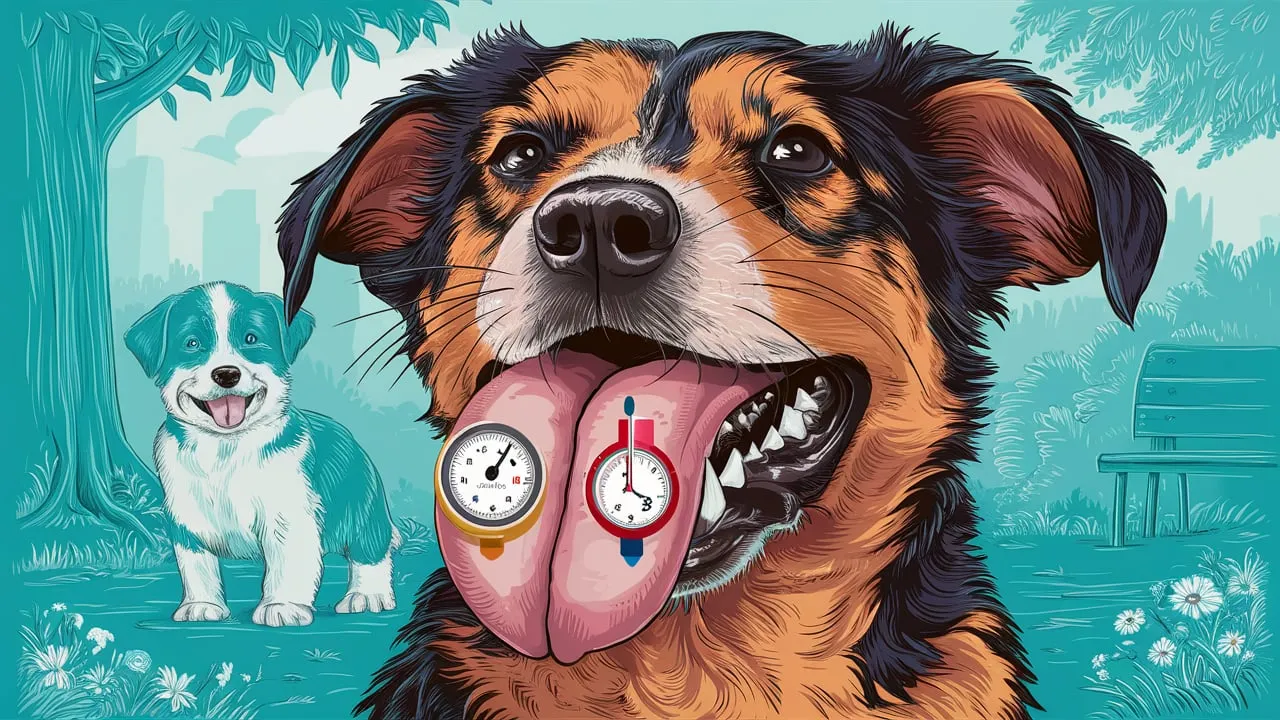Is your dog’s tongue unusually hot? Learn the common reasons Why Is My Dog’s Tongue Hot and when it’s time to call the vet. Get helpful tips for monitoring your dog’s health by Dogs Infor!
Understanding Dog Tongue Temperature
Normal Dog Temperature Range
A dog’s normal body temperature can vary slightly depending on breed, age, and activity level. However, a healthy dog’s temperature typically falls between 100.5°F and 102.5°F (38.1°C and 39.2°C).
Factors Affecting Tongue Temperature
Several factors can influence a dog’s tongue temperature, including:
- Activity level: A dog that has been exercising or playing will have a higher temperature than a dog that has been resting.
- Environment: A hot or humid environment can cause a dog’s temperature to rise.
- Stress: Stress can also elevate a dog’s temperature.
- Illness: A dog with an illness may have a higher or lower temperature than normal.
How to Take Your Dog’s Temperature
Taking your dog’s temperature can be helpful in determining if they are sick. Here’s how to do it:
- Gather your supplies: You will need a digital rectal thermometer and some lubricant, such as petroleum jelly.
- Prepare your dog: It’s best to have someone help you hold your dog securely.
- Lubricate the thermometer: Apply a small amount of lubricant to the tip of the thermometer.
- Insert the thermometer: Gently insert the thermometer into your dog’s rectum.
- Wait for the reading: Leave the thermometer in place for about one minute.
- Remove the thermometer: Carefully remove the thermometer and read the temperature.
Important Note: If your dog’s temperature is outside the normal range, or if you notice any other signs of illness, it’s important to contact your veterinarian immediately.

Common Reasons for a Hot Dog Tongue
Exercise and Activity
A dog’s tongue can feel hot after vigorous exercise or playtime. This is due to increased blood flow to the muscles, which raises the overall body temperature. This is usually a normal response and not a cause for concern.
Dehydration
Dehydration can also lead to a hot tongue. When a dog is dehydrated, their body struggles to regulate its temperature efficiently. This can result in a higher than normal tongue temperature.
Stress or Anxiety
Stress and anxiety can trigger a physiological response in dogs, including increased heart rate and respiration, which can lead to a rise in body temperature. This can manifest as a hot tongue.
Fever
A hot tongue can be a sign of a fever, which indicates an underlying illness. If your dog’s tongue is unusually hot, and they are exhibiting other symptoms like lethargy, loss of appetite, or vomiting, it’s crucial to seek veterinary attention.
Symptoms to Watch For
Panting
Panting is a normal way for dogs to regulate their body temperature, but excessive panting can be a sign of overheating or illness.
Lethargy
A lethargic dog may be sluggish, inactive, or have a decreased interest in their usual activities. This can be a sign of illness or discomfort.
Loss of Appetite
A dog that is not eating or drinking normally could be experiencing illness, pain, or discomfort.
Vomiting or Diarrhea
Vomiting or diarrhea can be symptoms of a variety of conditions, including infections, food poisoning, or parasites. If your dog is experiencing these symptoms, it’s important to contact your veterinarian.
When to See a Vet
High Fever
A high fever, especially if accompanied by other symptoms, is a serious concern and requires immediate veterinary attention.
Persistent Panting
If your dog is panting excessively, even when resting, it could indicate a serious medical condition. It’s best to err on the side of caution and contact your veterinarian.
Changes in Behavior
Sudden or significant changes in your dog’s behavior, such as increased aggression, anxiety, or confusion, could be a sign of a medical problem.
Other Signs of Illness
If your dog is exhibiting any other signs of illness, such as lethargy, loss of appetite, vomiting, diarrhea, or difficulty breathing, it’s important to seek veterinary care promptly.

Preventing Dog Illnesses
Regular Vet Checkups
Regular veterinary checkups are essential for maintaining your dog’s health and catching potential problems early. These checkups include vaccinations, parasite prevention, and general health assessments.
Proper Hydration
Ensuring your dog has access to fresh, clean water at all times is crucial for their overall health. Dehydration can lead to various health issues, including heatstroke.
Healthy Diet
A balanced and nutritious diet is vital for your dog’s immune system and overall well-being. Consult with your veterinarian to determine the best diet for your dog’s age, breed, and activity level.
Exercise and Mental Stimulation
Regular exercise and mental stimulation are essential for your dog’s physical and mental health. A tired dog is less likely to get into trouble and more likely to be happy and healthy.
Conclusion
A dog’s normal tongue temperature can vary, but a healthy dog’s temperature typically falls between 100.5°F and 102.5°F. If you notice your dog has a hot tongue or is exhibiting any other signs of illness, it’s essential to contact your veterinarian immediately. Early intervention can significantly improve the outcome of many health issues.

Related Post
Signs Your Dog Needs Probiotics: Digestive Problems
Green Stool In Dogs: Causes, Concerns And When To Worry
Dental Anatomy Of Dogs: Unveiling The Secrets